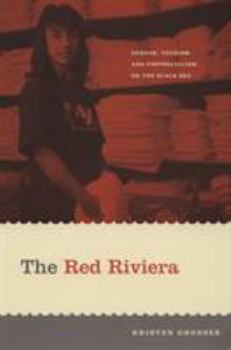The Red Riviera: Gender, Tourism, and Postsocialism on the Black Sea
(Part of the Next Wave: New Directions in Women's Studies Series)
Select Format
Select Condition 
Book Overview
This compelling ethnography of women working in Bulgaria's popular sea and ski resorts challenges the idea that women have consistently fared worse than men in Eastern Europe's transition from... This description may be from another edition of this product.
Format:Paperback
Language:English
ISBN:0822336626
ISBN13:9780822336624
Release Date:November 2005
Publisher:Duke University Press
Length:240 Pages
Weight:0.80 lbs.
Dimensions:0.6" x 6.0" x 9.3"
Customer Reviews
3 ratings
what an ethnography should look like
Published by Thriftbooks.com User , 14 years ago
I read this book while conducting a major literature review. And when I say I read this, I mean I actually read it. No skimming, no first and last chapter, no hurrying... just enjoyment, thoughtful reflection, and slow digesting. It was that good, especially in comparison to most other academic ethnographies out there! Briefly, Kristen Ghodsee looks at how women in Bulgaria have dealt with the transition from socialism to capitalism. Through stories of women working in the European tourism industry, she suggests that access to cultural capital (primarily skills and education) became more important in determining the success of women in the transition than access to money or networks. One of the areas women worked in during Soviet times was tourism, and many women continue to work in tourism now. She indicates that there is a sharp difference between women who have used their portfolio of capital successfully in the transition, and women who have not, but that the cultural capital developed during socialism matters. She further suggests that NGOs and feminists advocating for non-economic rights have not helped Bulgarian women get what they want -- economic access through education and further skills building. I truly enjoyed the experience of reading this book - from humorous dialogue, to case stories of young and middle-aged women in the Bulgarian tourist industry, to a thoughtful history of Soviet tourism and the realities of the post-Soviet Eastern European economy. Ghodsee has done a great job in writing this, and I highly recommend it. This is what an ethnography should look like!
Great story- not just for academic reading!
Published by Thriftbooks.com User , 17 years ago
The Red Riviera tells the engaging story of an economic, historical, and cultural revolution with a "ground level" focus on the lives of several women working within the tourist industry in Bulgaria. The portraits of these stereotype-defying women reveal a picture of far greater complexity than the statistical studies of the economic outcome of certain populations after the fall of communism. In a uniquely neutral look at life before and after the fall of the state run communist regime in Bulgaria, Ghodsee shines light not only on the good and bad points of communism vs. capitalism, but also on the way that the communist system inadvertently prepared some members of its society (exemplified by these women working in the tourist industry) to thrive after the advent of capitalism, while other members were utterly unprepared for the sudden change in "the rules", and floundered when the communist system that supported them collapsed. The book is fascinating as a study of the dynamics of the change from communism to capitalism. However, the real beauty of the book is the sheer delight of reading it. Ghodsee maintains the rigor of an academic study but writes with the clarity and rich descriptiveness of an entertaining work of fiction. The result is a book that races along as if it were a novel- the story of a major economic and cultural revolution, as seen through its focus on the lives of these intriguing women. In short, highly recommended!
An excellent book for teaching undergrads about postsocialism!
Published by Thriftbooks.com User , 18 years ago
The Red Riviera is a detailed, ethnographically rich study of the transition away from communism in Bulgaria, compellingly told through the eyes of women employed in the tourism industry. The book is short enough to assign for an undergraduate class and is written in a clear and accessible prose that is free from too much academic jargon. At the same time, the arguments advanced in the book are fascinating and controversial enough to inspire interesting and engaged discussions. In addition to exploring the details of the daily lives of men and women experiencing economic transformation, the book deals with how cultural capital gets revalued after socialism, and the relationship between Western feminist NGOs and women's organizing. A very good contribution to the literature of postsocialist cultural studies.




